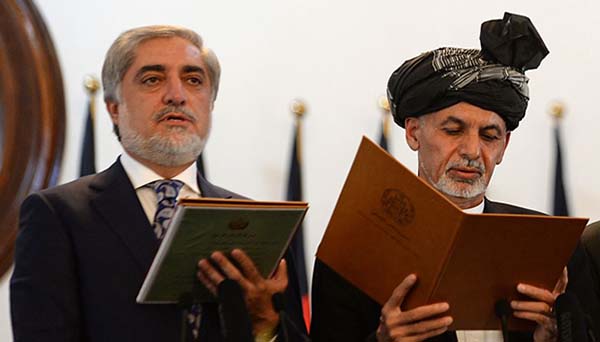Wrangling over the election outcome for months, a deal has been signed on September 21, 2014 to form a National Unity Government (NUG) in Afghanistan under which Muhammad Ashraf Ghani became president and Dr. Abdullah Abdullah assumed the office of chief executive officer (CEO) with powers similar to those of prime minister. Meanwhile, the president committed to convening Loya Jirga in two years for a “debate on amending the Constitution and creating a post of executive prime minister,” formalizing the CEO role.
Later, the election commission declared Mr. Ghani as winner of the bitterly fought poll. Without declaring the number of votes for each candidate or the turnout figures, Commission Chief Ahmad Yousaf Nuristani was cited as having said, “The Independent Election Commission declares Ashraf Ghani as the president, and thus announces the end of election process.”
After the formation of the National Unity Government in a speech to his allies Dr. Abdullah Abdullah stated that the National Unity Government was a significant step in bringing the nation together and minimizing ethnic, linguistic and regional divisions. “Together, we, the government of national unity, will be able to address the problems of the country,” Abdullah said. “We’ve come together, hand in hand, to work toward a better future.” He emphasized that the national unity government agreement was signed with the interests of the nation in mind and rejected the accusations of political deals for power.
According to the text of the political agreement, the National Unity Government agreed to the convening of the Loya Jirga and amending the Constitution:
Convening of a Loya Jirga to amend the Constitution and consider the proposal to create the post of executive prime minister.
On the basis of Article 2 of the Joint Statement of August 08, 2014 and its attachment, the President is committed to convoking a Loya Jirga for the purpose of debate on amending the Constitution and creating a post of executive prime minister.
After the inauguration ceremony, the president will appoint, in consultation with the CEO by executive order, a commission to draft an amendment to the Constitution.
However, twenty months after the inauguration of the National Unity Government, the timelines for convening Loya Jirga was not met. The electoral reform process has been excruciatingly slow and is set to culminate in a very watered-down version of its original mandate. It is very unlikely that Wolesi Jirga elections will be held this year, with the Independent Election Commission (IEC) in stasis: donors froze most of their funding, the chairperson resigned and the commission is awaiting a renewed selection process. No preparations have yet been made for district council elections that are supposed to take place for the first time.
On April 2016, the US Secretary of State John Kerry traveled to Afghanistan to attend the third meeting of the US-Afghan Bilateral Commission, but his visit was also a show of American support for the NUG. He commended the government for its progress and praised the two leaders for “standing together”.
While Kerry’s remarks were widely seen as a de facto extension of the National Unity Government’s term, the de jure arrangement after the two-year timeframe mentioned in the agreement remains a matter of contention. Some put the legitimacy of NUG under question and believed that the terms of NUG end after two years and it is the Loya Jirga to decide over the issue.
However, the President’s Office, when asked for its views, gave the regular assurances that the president was committed to implementing the political agreement and that the parliamentary and district council elections would be held and the Loya Jirga convened, probably with some delays, though.
Constitutionally, the work period of Parliament will terminate after announcing the results of presidential election and parliamentary election will be held one or two months before the expiration of the parliament’s period. Currently, although the legal period of parliament has been terminated long ago, there is no preparation for election.
Moreover, it is stated in the constitution as, “The Government shall be comprised of Ministers who work under the chairmanship of the President.” With great surprise, two years have passed from presidential election, the cabinet yet to be completed. As a result, the ministry of defense is being controlled by acting head, despite the mounting insurgency and Taliban’s heavy offensives.
Considering these facts, the unity government is entangled with many challenges and the public believe that clashes about power sharing have compounded the issues. Lack of transparency in election and repeated delay of announcing electoral results by Election Commission was the root of problems.
It is believed that the burgeoning democracy is also moribund since little attention is paid to constitution. As mentioned before, termination of legal period of parliament and no preparation for new election and electoral frauds are in direct conflicts with the law. Therefore, it is a slap in the face of democracy. It is hoped that government will conduct parliamentary election as soon as possible, complete members of cabinet, enforce the law strictly, amend Election Commission and pay due attention to constitution and constitutional law so as to put an end to the challenges going on across the country and catalyze the democratization process.
Home » Opinion » The National Unity Government
The National Unity Government
| Hujjatullah Zia

